Герундий в форме Indefinite Active совпадает с отглагольным существительным, образованным от основы глагола при помощи суффикса -ing. Однако между ними имеются различия, о которых нужно помнить.
1. Отглагольное существительное, в отличие от герундия, не имеет формы времени и залога, не принимает прямое дополнение и не определяется наречием.
2. Отглагольное существительное употребляется с артиклем, имеет форму множественного числа, может определяться прилагательным, притяжательным местоимением или существительным в притяжательном падеже, а также употребляется с предлогом of.
Герундий не употребляется с артиклем, не имеет формы множественного числа, не может определяться прилагательным и не употребляется с предлогом of. Сравните:
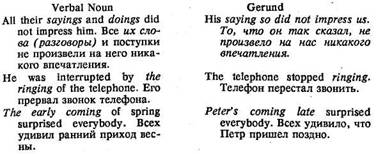
3. Отглагольное существительное чаще всего переводится на русский язык существительным.
Герундий может переводиться на русский язык существительным, инфинитивом или придаточным предложением.
Exercise 7. Read and translate these sentences. Pay attention to the difference between gerunds and verbal nouns.
1. She was watching the comings and goings in the house. 2. There is no telling when they will manage to get there. 3. "I do not mind the children playing in the garden," he said. 4. Jane told us of his various comings and goings. 5. "I love bathing. Is the bathing safe here?" she asked Jane. 6. Do you remember my asking you to lend me a dictionary? 7. It seemed that the stopping of the clocks had stopped time in that house. 8. "The reading of today's paper will take you quite a time. There's a lot of interesting material in it," said Ann. 9. Reading papers took him a lot of time every day. 10. His ideas are well worth listening to. 11. He liked neither reading aloud* nor being read to. 12. The child was tired of running quickly all the way.
* aloud [a'laud] вслух
TEXT
Learn these speech patterns
1. He is not the first scientist to disappear. Это не первый случай исчезновения ученого.
Не was the first to call on them after they had returned. Он первым навестил их после того, как они вернулись.
She was the last to come to his birthday party. Она пришла последней на вечер по случаю его дня рождения.
Exercise 1. Make up sentences using the table and translate them.

Exercise 2. Translate into English.
1. Брат Анны первым стал собирать марки. 2. Джон первым поздравил его с успехом. 3. Кто сдал свою работу вторым? 4. Почему вы последним пришли на заседание?
2, a) I'm not prepared to have the knowledge of this place broadcast to the globe. Я еще не готов к тому, чтобы сообщить о местонахождении центра, (я не готов поручить кому-либо сообщить о местонахождении центра)
b) I must have ту baggage registered. Мне нужно сдать вещи в багаж, (я должен поручить кому-либо сделать это)
Exercise 3. Make up sentences using the table and translate them.

Exercise 4. Complete these sentences using the words given in brackets. Translate them.
1. I'd like to have (to complete, the job) by next Wednesday. 2. You must have (to discuss, the offer). 3. He should have (to fix, the watch). 4. He must have (to examine, the documents).
Learn these words and word combinations
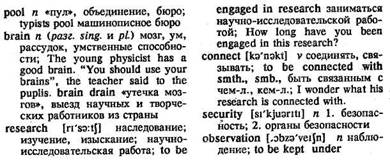
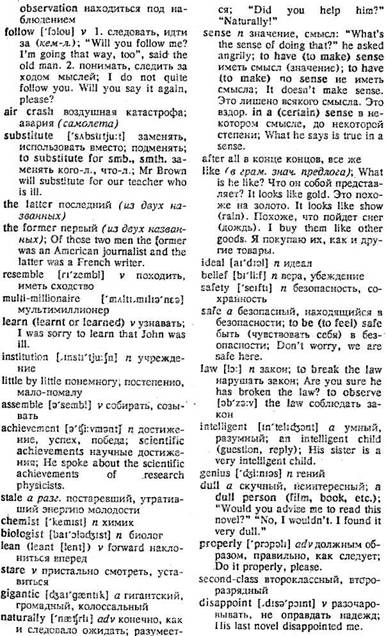
Exercise 5. Read and translate these sentences. Pay attention to active words and word combinations.
1. We found it hard.to follow the speaker. 2. "This sentence makes no sense. Will you change it?" said the teacher. 3. To be able to do research one should have a good brain. 4. "Are you connected in any way with Dr Brandon's research?" he asked. 5. "1 don't mind substituting for Miss Jackson while she's away," said Mrs Langland. 6. For quite a while Mr Brown and Mr Smith could not come to agreement. The former insisted on starting experiments next week, the latter objected saying they were unprepared. 7. "I don't think we should go for a walk now. It looks like rain," said Max. 8. "Do you think his mother's disease may affect his decision?" Peter asked. 9. They intend to supply the new college with laboratory equipment. 10i In a certain sense he is right. 11. You are not very reasonable if you expect him to change his mind at once. 12. Everyone was disappointed in his new novel.
A POOL OF BRAINS
Thomas Betterton, an outstanding British scientist, disappears suddenly fr6m the conference he is attending in Paris. He is not the first young scientist to disappear. During the previous years quite a few young talented scientists from France, Belgium, England and the USA have left their countriCiS and are nowhere to be found.
The British Intelligence Service * is interested in Betterton's disappearance as his research is connected with security matters. His wife is kept under observation. The BIS1 agents follow her to Africa where she goes two months later. Mrs Betterton dies in hospital after an air crash. The BIS decides to substitute Hilary Graven for Mrs Betterton as the latter resembles her very much.
Hilary Graven is met by somebody's agents and taken to the Unit, a research centre owned by Aristides, a world-famous multi-millionaire.
A few days later Hilary is invited to Aristides's study where she has a conversation with the owner of the Unit. From the conversation she learns what kind of institution the Unit is.
"I am a businessman," said Mr Aristides. "I am also a collector. I have collected many things in my time. Pictures — I have the finest art collection in Europe. My stamp collection is also world-famous. I am an old man, Madame, and there was not very much more for me to collect. So I came at last to collecting brains."
"Brains?" Hilary looked up in surprise. Aristides nodded.
"Yes, it is the most interesting thing to collect of all. Little by little, Madame, I'll assemble here all the brains of the world. Young men of promise, young men of achievement and experience. One day the tired nations of the world will wake up and realise that their scientists are old and stale, and that the young brains of the world, the doctors, the research chemists, the physicists, the surgeons, are all here in my keeping. And if they want a scientist, or a surgeon, or a biologist, they will have to coaie and buy him from me!"
"You mean..." Hilary leaned forward, staring at him. "You mean that this is all a gigantic commercial enterprise?"
"Yes, naturally," he said. "Otherwise — it would not make sense, would it? After all, it is my profession. I am a businessman."
"But how do you make ail these people come here?"
"I buy them, Madame, like any other goods. Sometimes I buy them with money. More often, I buy them with ideas. Young men have ideals. They have beliefs. Sometimes I buy them with safety — those that have broken the Jaw."
Then he added. "We do not encourage wives here but I was pleased to think that you would be coining. You are intelligent. I do not find many intelligent people in this place to talk to. These scientists, these biologists, these research chemists, they are not interesting. They may be geniuses at what they do, but they are uninteresting people to talk to."
"Their wives," he v/ent on, "are usually very dull, too. I permit wives only in those cases where a husband is unable to do his work properly because he is thinking too much of his wife. That seemed to be the case with your husband. Thomas Betterton is known to the world as a young man of genius, but since he has been here he has done only second-class work. Yes, Betterton has disappointed me."
"But don't you find it natural? These people are, after all, ia prison here I believe they rebel? At first, at any rate?"
"Yes," Mr Aristides agreed. "That is only natural and inevitable. It is so when you first cage a bird. But if the bird has all that it needs it forgets is the end that it was ever free." "You frighten me," Hilary said. "It's dreadful. It's like a typists' pool! You've got a pool of brains here. And from this pool, you intend one day to sell scientists to those who pay you best for them? But once your scientist is in the free world again, he could refuse to work for his new employer. He would be free again."
"True up to a point. 3 There may have to be a certain — coaditioniag, shall we say?"
"What do you mean by that?" "You have heard of leucotomy, Madame?" "That's a brain operation, isn't it?" she asked. "Yes. It was devised originally for curing melancholia. After the operation the patient has no more desire to commit suicide, no further heelings of quilt. He is in most cases obedient. I have here three surgeons. By various operations they are arriving at a state where obedience can be assured without affecting mental brilliance 4. After the operation a person will accept any suggestion made to him."
"But that's horrible," cried Hilary. "Horrible! I do not believe a contented anisal will ever produce creative work cf real brilliance."
Aristides thought a little, then said, "Perhaps. You are intelligent. You may have something there. Time will show. Experiments are goiug on all the time."
"Experiments! On human beings, you mean?"
"Certainly. That is the only practical method."
Hilary felt a deep horror of this smiling, yellow-faced little man with an inhuman outlook on life. Everything he said was so reasonable, so logical and so business-like, that it made the horror worse. Here was no madman, just a man to whom his fellow men were so mucla raw material.
"But can't you let aay of these people go?" she asked. "That would be unreasonable. But you are pleading for your husband, I understand. I admit I am very disappointed in Thomas Bettertoa. I hoped that your presence here might restore him to his brilliaEce. But year coming seems to have had little or no effect."
"There are birds that cannot sing in captivity," s said Hilary. "Write off Thomas B'ettertoa as one of your failures. Let him return коше."
"That would hardly do, б Madame, I am not yet prepared to have knowledge of this place broadcast to the globe," Aristides said.
(From "Destination Unknown" 7, by Agatha Christie)
Names
Thomas Betterton ['tomss 'betstn ] Томас Бетертон
Hilary Graven ['hiisri 'greivn] Хилари Грейвн
Aristides [,&ris'taidi:z ] Эристайдиз
Notes
1. The BIS (British Intelligence [m'telidsans ] Service). Разведывательная служба Великобритании
2. are all here in шу keeping все здесь у меня (содержатся здесь у меня)
3. True up to a point. До некоторой степени это так (это правильно).
4. they are arriving at-a state where obedience can be assured without affecting mental brilliance они (хирурга) подходят к такому этапу, когда (в результате операции) можно обеспечить покорность, не затронув (не повредив) гениальные способности
5. There are birds that cannot sing in captivity [kasp'tivsti ]. Есть птицы, которые не поют (не могут петь) в. неволе.
6. That would hardly do. Вряд ли это возможно.
7. "Destination [,desti'nei{n] Unknown" «Место назначения (прибытия) неизвестно»
Exercise б. Read and translate the text.
Exercise 7. Find in the text English equivalents for these word combinations and sentences.
1. решают, чтобы Хаяэри Грейвн заменила миссис Бетертон. 2. из разговора она узнает, что собой представляет. 3. Конечно. Иначе это не имело бы смысла. 4. Здесь я встречаю не очень много умных людей. 5. Не считаете ли вы это естественным? 6. что отвращение (ужас) возросло (возрос).
Exercise 8. Give Russian equivalents for these sentences.
1. The BIS agents follow Mrs Betterton to Africa. 2. as the latter resembles Mrs Betterton very much. 3. I buy them with safety — those that have broken the law. 4. There may have to be a certain conditioning, shall we say? 5. After the operation the patient has no more desire to commit suicide. 6. Hilary felt a deep horror of this smiling, yellow-faced little man with an inhuman outlook од life.
Exercise 9. Answer these questions.
1. Why did the BIS 'decide to substitute Hilary Graven for Mrs Betterton? 2. What made Aristides start collecting "brains"? 3. What did Aristides mean by saying "otherwise it would make no sense"? 4. How did Aristides get the young scientists to come ti the Unit? 5. In what cases did Aristides allow wives to come to the Unit? 6. Do yoa share Aristides's opinion that "if the bird lias all it needs it forgets in the end that it was ever free"? 7. What did Hilary mean by saying "a contented animal will never produce creative work of real brilliance"? 8. What do you think of Aristides? 9. Could something of the kind happen in reality?*
* in reality [ri'ssl:ti] в действительности
Exercise 10. Make up sentences using the tables and translate them.
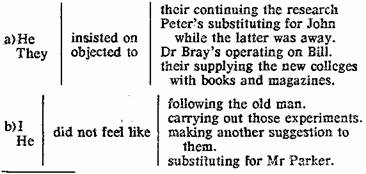
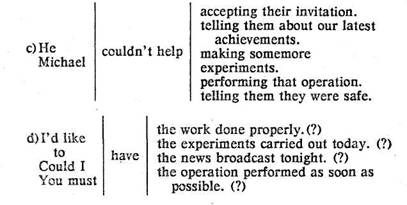
Exercise 11. Make the necessary substitutions and reproduce the dialogues.
1. A: Do you mean you intend to start writing the article today?
B: Naturally. It's time to start.
(A: experimenting next week, discussing the problem tomorrow)
2. A: Will you or will Peter substitute for Bill?
B: Peter will.
(A, B: John, Charles, Tom)
3. A: Cold weather didn't have any effect on him.
B: It was only natural. He's a healthy* young man.
* healthy ['he!0i] здоровый
(A- hot, rainy)
Exercise 12. Insert the words given below.
1. Once he starts doing something, you may be sure he will do it.... 2. I know the way there. Please... me. 3. "I admit I was mistaken. Your... are a great success," said Mr Coke. 4. "What is the... of doing that now?" the old man asked him. 5. Let's go for a walk if you feel... walking. 6. A young promising surgeon is said... wonderful... on the brain. 7. For a... reason he went away before I could discuss the matter with him. 8. His... for knowledge is surprising. 9. "I don't advise you to read the novel. It's rather...," he said. 10. There is a very interesting article about the scientific... in today's paper. 11. He... us that he needed only two days to complete the job.
dull, certain, experiments, properly, sense, to follow, to perform, to assure, operations, desire, achievements, like
Exercise 13. Make up twejve questions based on the text "A Pool of Brains" and answer them.
Exercise 14. Insert prepositions or adverbs.
1.... last the doctors agreed that an operation... the brain should be performed. 2. What was Mr Williams operated......? 3. I am afraid your decision to give up experiments had no effect... him. 4. "Do you mean it's possible to buy scientists... any other goods?" asked Hilary. 5. The BIS agents were worried... the disapperance of Thomas Betterton as his research was connected... security matters. 6. Do you think Dr Ingram was disappointed... Dr Nicholas after he learned... the latter's decision to leave for home? 7.... first nobody wanted to supply them... necessary information. 8. You will be the first to substitute... the talented surgeon. 9. I assure you he is a man... narrow outlook... life. 10. The young doctor felt happy when he managed to cure his first patient... a serious disease.
Exercise 15. Make up eleven sentences using these word combinations.
to be connected with, to learn about, to look like, to feel like, to have an effect on smb. (smth.), to be disappointed in, to supply smth. to smb., for a certain reason, to carry cut an experiment, with, a (broad) narrow outlook on life, to cure smb. of smth.
Exercise 16. Transform these sentences into reported speech.
1. "I have the finest art collection in Europe," said Aristides. 2. "If a nation wants a scientist it will have to come and buy him from me," Aristides said. 3. "How do you make all these people come here?" asked Hilary. 4. "Thomas Betterton has disappointed me," Aristides added. 5. "Don't you find this natural?" Hilary asked Ыш. б. "But can't you let any of these people go?" she asked.
Exercise 17. Insert articles or possessive pronouns wherever necessary. Give a summary of the text.
The man said to Hilary Graven, "My name's Jessop. I'm from... British Intelligence Service. I think you've read in... papers about... disappearance of young scientists from time to time. Quite... few physicists, chemists, biologists and other scientists with... knowledge of.. state security matters seem to disappear here, there and everywhere. Did they intend to go? Were they kidnapped? * These are... questions you might help us to find out!"
* kidnap ['kidnaspl похищать
Hilary stared at Mr Jessop, "Me? How?"
The latter went on, "I'm coming to... case of Thomas Betterton. He's... young brilliant physicist. His research was connected with... security matters. Two months ago be left for Paris to attend... scientific conference.... few days later he disappeared. His wife said she had no idea where he had gone or why. She didn't seem to be anxious about... husband.... short while ago she bft London saying to her friends that her health was badly affected and she needed a rest. We arranged to have her followed. It was bad luck that... plane crashed here on landing * last night. Mrs Betterton was taken to... hospital with... bad injury. She will die in... day or two."
* it was bad luck that... plane crashed here on landing очень не повезло, что самолет потерпел аварию при посадке
"How horrible!" said Hilary.
Jessop continued speaking, "... fact is that you resemble Mrs Betterton very much. We'd like you to substitute for her and do what she intended to."
"But that's a gigantic hoax,*" said Hilary slowly. "I'm sure they'd recognize me."
* hoax [houks] обман
"That would depend on your acting properly. Do you feel like... trying?" Jessop asked her.
"All right. I'll try to do this," Hilary answered.
Exercise 18. Say if these statements are true or false. Give your reasons.
1. Mr Aristides was interested in assembling outstanding scientists to work on a scientific problem. 2. Hilary shared Mr Aristides's view that if ascientist had all he needed he might forget he was not free. 3. Mr Aristides believed that the scientists whom he kept in the Unit were able to produce creative work. 4. Mr Aristides agreed to let Thomas Betterton return home.
Exercise 19. Give a summary of the text "A Pool of Brains".
Exercise 20. Translate into English.
1. «Я не против того, чтобы подменить г-на Брауна. В любом случае позвоните мне сегодня вечером», — ответил Чарльз. 2. «Молодой ученый, — говорил Эрнест Резерфорд (Ernest Rutherford t's:nist 'rASsfsd]), выдающийся английский физик, — должен иметь глубокие знания, творческий ум (подход) и склонность (должен быть склонен) к проведению бесконечных (endless) экспериментов». 3. В последние двадцать лет очень возросла «утечка мозгов» из развивающихся стран в США. 4. Он прочел письмо во второй раз и снова не мог понять смысл последних фраз. 5. «Это едва ли возможно. Как только вы согласитесь, вам сразу же придется приступить к проведению экспериментов», — сказал он. 6. «Сегодня я должен встретиться с г-ном Грином. Что он собой представляет?» — спросил Петр. 7. Простите, но довольно трудно следить за ходом ваших рассуждений (следовать за вами). Повторите еще раз, пожалуйста. 8. Я никогда не думал, что он человек с узким кругозором. 9. В силу каких-то причин письмо не оказало никакого воздействия на его сына. 10. Похоже на то, что будет дождь, а у меня не желания промокнуть. 11. Вы не возражаете, если вашего отца будет оперировать д-р Брэдли? 12. Никогда не забуду, как я проводил свой первый опыт в лаборатории.
Exercise 21. Think of situations in which these sentences can be used.
1. Naturally. Once you say "yes", you have to keep your promise. 2. I'm afraid you're mistaken. He wasn't the first to operate on the brain. 3. I wouldn't say I feel like reading this book. Everyone says it's dull. 4. So you think he is a man with a narrow outlook on life. 5. I'm sorry to say I don't quite follow you. 6. What is he like?
Exercise 22. Debate these problems. Give your arguments "for" and "against".
The argument: key sentences.
1. Great scientists will never produce creative work of real brilliance if they are not free.
2. People like Aristides should be put in asylums.
The counter-argument: key sentences.
1. Every person is free to collect whatever he chooses.
2. Most scientists are indifferent to politics. All they need is favourable conditions for research.
3. People like Aristides promote scientific progress.
Exercise 23. Speak on these topics.
1. Aii outstanding scientist. 2. Scientific fiction.
LESSON SIXTEEN
Conversations: A. An Invitation to a Conference. B. At the Office Equipment Exhibition. C. There is No Alternative to Detente. D. Scientists Should Protest.
Learn these words and word combinations
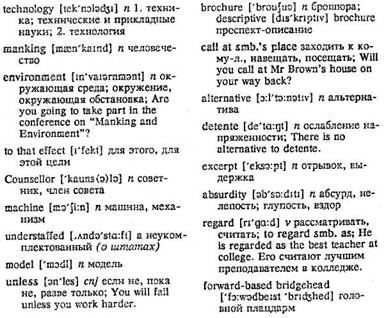
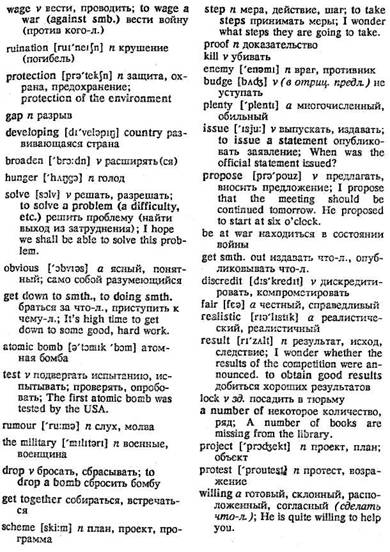
A. An Invitation to a Conference
Petrov: Petrov speaking.
Mr Dixon: Hello, Mr Petrov. Can I Speak to Mr Ivanov, please?
P: Mr Ivanov is away and he'll be back at the end of next week. Can I help you?
D: This is Dixon from the Department of Transportation.1 I wonder whether Mr Ivanov has received our invitation to the Conference on "Transportation and the Environment"?
P: Yes, he received your invitation but unfortunately he won't be able to come, as he'll be away at that time. I believe he's sent you a letter to that effect.
D: That's too bad. Could somebody else come?
P: I'll speak to the Counsellor and let you know later.
D: Thank you. Hope to hear from you soon. Bye.
P: Goodbye.
B. At the Office Equipment Exhibition
Salesman (to Mr Brown): It's a very useful little machine. It can take phone messages when there's no one in the office.
Mr Brown: That would be an advantage.2 We're very understaffed at the moment.
Salesman: And you can dictate your letters into this taperecorder if the secretary isn't available.
Mr Brown: Would you mind if I looked at other models?
Salesman: Not at all, sir. But unless you want to pay a lot more, you won't find a better one.
Mr Brown: I'd better see what the boss has to say about it.
Salesman: Yes. Take this descriptive brochure with you. Would you like our representative to call at your office?
Mr Brown: I'll let you know, shall I? Salesman: Thank you. Here's my card. That phone number will usually get me.
C. Scientists Should Protest
July 27, 1945. The English scientists working on the atomic bomb at Barford learn that the USA has tested an atomic bomb in New Mexico. There are rumours that the American military are going to drop an atomic bomb on a Japanese town. The Barford scientists anxious about the future use of atomic bombs get together for a discussion.
Francis Getliffe (an outstanding English physicist): As far as I know the argument between the American military and the scientists is still going on. The scientists are against using the bomb, the military are for it.
Luke: We were all agreed if there were no other way of saving the war against Hitler we would be prepared to drop the bomb.3 Now it's different.
Getliffe: Even then we had a scheme. Step one. Inform the enemy that the bomb was made, and give them enough proof. Step two. Drop one bomb where it will not kill people. Step three. If the enemy government will not budge, then drop the next on a town.
Martin Eliot: What can we do now? Luke: There's plenty we can do.
Mounteney (an outstanding scientist, a Nobel prize-winner): There is plenty we can do but there's only one way we can make it impossible for the military.
Getliffe: What's that?
Mounteney: Issue a statement saying what has happened about the bomb and what is proposed. That will settle it in one.4
Nora Luke: Who is to issue the statement? Mounteney: We are.
Getliffe: Breaking the law? Breaking our oaths? Mounteney: I don't like that. But there's no other way.
Luke: We're still at war. We shall never get the statement out.
Mounteney: I think we should. We might be unlucky. In that case a few scientists would be discredited. If we do nothing, then all scientists will be discredited. I shan't mind putting the statement out by myself.
Martin Eliot (smiling to Mounteney): No, Arthur. That's not fair. What's more important, it isn't realistic, you know. We couldn't let you do it unless (a) it was certain to work, (b) there was no alternative. It just wouldn't work.5 The only result would be that a Nobel prizewinner would be locked for trying to break the Official Secrets Act,6 and the rest of us would not be able to open our mouths.
Mounteney: I don't see any other way.
Martin Eliot: We do. It's known that a number of scientists working on the American project have signed a protest. We'suggest that two or three English scientists should be flown over to America. They should take the list of the English scientists who are supporting the protest. As far as I understand everyone at Barford is willing to sign except Drawbell.
Luke: Who should go?
Martin Eliot: I think Mounteney and Francis Getliffe. They're known to American scientists. Mounteney has his Nobel prize and Francis has a great name in Washington for his war work.
(After "The New Мея"Ьу С. Р. Snow)
Names
Barford ['ba:fad] Барфорд
New Mexico ['neksikou] Нью-Мексико (штат США)
Francis Getliffe ['fra:nsis 'dsetlif ] Франсис Гетлиф
Luke [lu:k] Люк
Martin Eliot ['eljat] Мартин Элиот
Arthur Mounteney ['mauntani] Артур Маунтеней
Drawbell ['dro:bl] Дроубел
Notes
1. Department of Transportation [.tra:nspo:'tei|n] Департамент (управление) транспорта
2. That would be an advantage. Это действительно преимущество.
Would be — форма сослагательного наклонения.
3. We were all agreed if there were no other way of saving the war against Hitler we would be prepared to drop the bomb. Мы все считали, что если нельзя будет никакими другими средствами одержать победу над Гитлером, то нужно будет сбросить атомную бомбу.
4. That will settle it in one. Это сразу же решит все.
5. It just wouldn't work. Просто из этого ничего не выйдет.
6. the Official Secrets Act закон о сохранении (неразглашении) государственной тайны
Exercise I. Read and translate the dialogues.
Exercise 2. Find in the dialogues English equivalents for these word combinations and sentences.
1. конференция по проблемам транспорта и окружающей среды. 2. если нет секретаря. 3. но если вы не хотите платить гораздо больше. 4. чтобы наш представитель зашел к вам в контору. 5. ученые Барфорда, обеспокоенные... 6. и представить достаточно веские доказательства. 7. выступить с заявлением. 8. я не имею ничего против того, чтобы самому выступить с заявлением. 9. Это не реально. 10. целый ряд ученых. 11. согласны (готовы) подписать.
Exercise 3. Quote the sentences in which these words and word combinations are used in the dialogues and translate them.
tape-recorder, unless, representative, to preserve peace, to resume talks, to comment on, to regard as, to wage, mankind, developing countries, to get dov/n to doing, test, to get together, against, enemy, to issue a statement, to propose, result, protest, to suggest, to be willing
Exercise 4. Write out from the dialogues all sentences containing gerunds, define their functions and translate the sentences.
Exercise 5. Make the necessary substitutions and reproduce the dialogues.
1. A: I wonder whether Petrov has received our invitation to the Conference on Transportation and Environment.
В: Yes, he received your invitation but unfortunately he won't be able to come as he'll be away at that time.
(A: Science and Mankind; Mankind and Environment, B: and he sent a letter of confirmation yesterday; and he was going to phone you after lunch)
2. A: Would you like our representative to call at your office?
В: I’ll let you know later.
(B: Yes. He can come next Tuesday. Not now. I'll let you know tomorrow.)
3. A: I suggest we should issue a statement.
B: I don't think ifs realistic.
(A: get together and discuss the problem; get down to business at once; 3: I'm all for it. I agree.)
Exercise 6. What would you say if you took part in these dialogues? Dramatize them.
1. A: Can I speak to Mr Nekrasov, please?
B:...
A: This is Anderson from the Board of Trade. I wonder whether Mr Nekrasov received our invitation to the British Motor Show.
B:...
A: Thank you. Hope to hear from you soon. Bye.
B:...
2. S: This is a new model of car.
B:...
S: It needs less petrol.* It's a most economical car.
* petrol t'petrl] бензин
B:...
S: Not at all. But unless you want to pay a lot more you won't find a better one.
3. Customer: Is this a new model of tape-recorder?
Salesman:...
A: Would you mind if I looked at other models?
S:...
C: Thank you. I'll come back if I don't find a better one at that price.
4. Q: What do you think should be done to relax international tension?
A-...
5. Q: I wonder what you think of the US theory of the "Mmited"nuclear war?
A:...
6. Q: Could you comment on the present international situation?
A:...
7. Q: What advantages do you see for mankind in case of detente?
A:...
8. Q: Why are all progressive people for detente and disarmament?
A:...
9. Q: What scheme was proposed by the English scientists in case an atomic bomb were used against Hitler?
A:...
10. Q: What did Arthur Mounteney suggest?
A:...
Q: Did other scientists find his proposal realistic?
A:...
11. Q: What was Martin Eliot's proposal?
A:...
Exercise 7. Think of situations ia which these sentences can be used. Dramatize them.
1. Yes, she received your invitation but unfortunately she won't be able to come. I believe Belova has sent you a letter to that effect. 2. Would you mind if I looked at other models? 3. I'll think it over and let you know tomorrow. 4. Here's my card. That phone number will usually get me. 5. There is no alternative to peaceful coexistence and detente. 6. Talks on limitation of armaments should be resumed as soon as possible. 7. A "limited"nuclear war means death and ruination to mankind. 8. International detente is both necessary and possible.
Exercise 8. Reproduce dialogues А, В, С, D in pairs.
Exercise 9. Translate into English.
1. — Попросите, пожалуйста, г-на Королева.
— Г-н Королев в отъезде. Могу ли я помочь вам? Говорит Иванов.
— Здравствуйте, г-н Иванов. Говорит Джексон из Министерства торговли (Board of Trade). He знаете ли вы, получил ли г-н Королев наше приглашение присутствовать на открытии автомобильной выставки?
— Да, он получил приглашение и послал подтверждение вчера. Он сможет присутствовать на открытии выставки. Он возвращается послезавтра.
— Спасибо.
2. — Я надеюсь, вам понравится этот станок (machine [ma'fbri] tool).
— Это ваша последняя модель?
— Да. Причем наш станок стоит дешевле, чем станки других фирм.
— Есть ли у вас проспект?
— Вот, пожалуйста. Вы можете взять его.
— Спасибо. Я подумаю и сообщу вам на следующей неделе о нашем решении.
3. — Международная обстановка ухудшается (to worsen, to deteriorate [di'tisnareit]). Необходимо принять меры, чтобы сохранить мир.
— Я считаю, что необходимо, чтобы восторжествовала (победила) политика разрядки.
— Полностью с вами согласен. У нас нет иной альтернативы, кроме мирного сосуществования и разрвдки.
— Только в условиях разрядки можно будет решить многие проблемы, которые имеются у развивающихся стран.
— Да, разрядка — это объективная реальность, и все люди в мире должны понять это.
4. — Считаете ли вы, что возможна «ограниченная» ядерная война?
— Это абсурдная доктрина. В наше время не может быть «ограниченной»ядерной войны. Ядерная война означает уничтожение человечества и окружающей среды.
— Необходимо, чтобы прогрессивные силы объединились (to unite [ju:'nait]) в борьбе против империалистических сил, заинтересованных в развязывании ядерной войны (to unleash a war).
5. — У развивающихся стран масса нерешенных проблем.
— К тому же разрыв между развитыми и развивающимися странами увеличивается.
— Одной из самых острых проблем в этих странах является проблема голода.
Exercise 10. Dramatize these situations.
1. A foreign colleague phones you to invite to the conference "Chemistry and Environment" ("Electric Power Stations and Environment", etc.). a) Accept the inyitation and thank him. b) Say you cannot accept the invitation as you will be away at that time.
2. You are invited to af attend an International Trade
Exhibition. Walk along the stands and choose models that may be of interest.-to you. Discuss their advantages and disadvantages with the company's representative.
3. Discuss the present international situation.
4. Share your impressions * with a foreign colleague of the problems taken up by the scientists in "The New Men"by С P. Snow.
* share your impressions поделитесь впечатлениями
LESSON SEVENTEEN
NEW GRAMMAR STRUCTURES
The Complex Sentence (Сложноподчиненное предложение)
Придаточные предложения делятся на следующие основные типы:
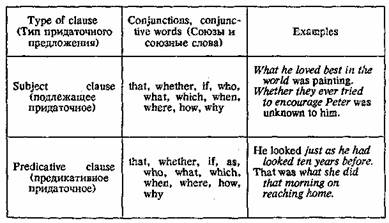
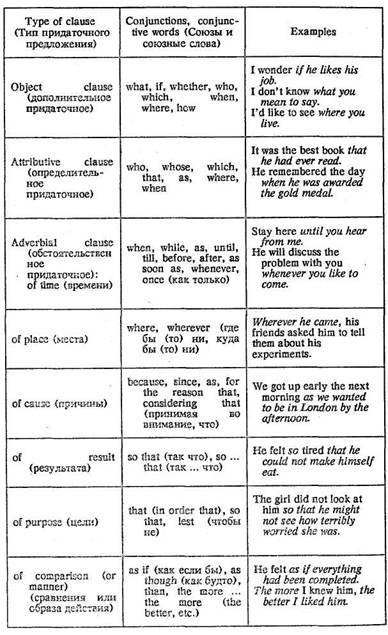
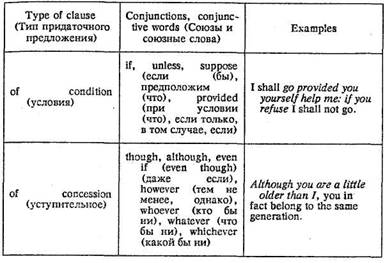
1. В английском языке обязательно наличке подлежащего в составе дополнительного придаточного предложения, тогда как в русском языке подлежащее может быть опущено. Сравните:
Не told me all that he knew. Он рассказал мне все, что знал.
2. Для разговорной речи характерно бессоюзное присоединение дополнительных придаточных предложений.
I'm afraid he hasn't got our letter yet. Боюсь, что он еще не получил нашего письма.
3. В современном английском языке наблюдаются случаи бессоюзного присоединения определительных придаточных предложений. Могут быть опущены относительные местоимения whos (m), whose, which, играющие роль любого члена предложения, кроме подлежащего.
Everything depends on the way the matter is presented to the Committee. Все зависит от того, как вопрос будет представлен в комитете.
4. Относительное местоимение which может относиться как к одному из членов определяемого им предложения (на русский язык оно переводится который), так и ко всему определяемому предложению (на русский язык в этом случае оно переводится относительным местоимением что).
He said he saw them there, which was not true. Он сказал, он видел их там, что было неправдой.
Exercise I. Read these complex sentences and define subordinate clauses. Translate the sentences into Russian. Look up the words you do not know in the dictionary.
1. This was what I wanted to do. 2. "What you ask is impossible," said Harris. 3. Whether he talked or not made little difference to me then. 4. "May I ask how you heard this?" he said. 5. What we've got to decide now, however, is whether we really trust him or not. 6. And this is what he remembered. 7. Now the question is whether he'll go back on his word or not. 8. But you know perfectly well this is not what I meant. 9. Which team wins does not concern us here," he said. 10. I'm sorry that I allowed you to call on us. 11. Eric wondered whether Haviland was really the man he ought to work for. 12. Genius does what it must, and talent does what it can. 13. Then Harris, who was sitting near the window, looked out. 14. In the distance lay the park where the trees were covered with snow. 15. Have you found the book we were talking about the other day? 16. The lecturer dwelt on the fact he had mentioned previously. 17. I saw everything there was to see. 18. I was back where I had been before. 19. I shall always think so as long as I live. 10. The weather was wet and cold for quite a while, as it often can be in the west country in early summer. 21. Since he seemed nervous even at the dress rehearsal, Mary agreed not to go. 22. I recommend you to take care of the minutes, for the hours will take care of themselves. 23. As a novel it fails, for the characters are wooden and uninteresting, but as a piece of fictionalized reporting it is excellent. 24. I was terribly afraid lest someone might meet me there. 25. I'll change the ticket so that you may be able to go with the evening train. 26. He always treated boys as if they were his equals. 27. Whatever we do we must think of him as well as of ourselves. 28. Though she had only twice seen Mr Bell, she recognized him at once. 29. Actually, passive as he may seem in comparison with his predecessors, today's student is anything but smug. 30. Being asked whether it was better to marry or not, Socrates replied, "Whichever you do, you will repent it." 31. Noise proves nothing. Often a hen who has merely laid an egg cackles as if she laid an asteroid. 32. To have the reputation of possessing the most perfect social tact, talk to every woman as if you loved her, and to every man as if he bored you.
Exercise 2. Read the text and give a summary of it (orally and in writing). Use complex sentences.
Whether work should be placed among the causes of happiness may perhaps be regarded as a doubtful question. There is certainly much work which is exceedingly irksome, and an excess of work is always very painful. I think, however, that provided work is not excessive in amount, even the dullest work is to most people less painful than idleness. (There are in work all grades, from mere relief of tedium up to the profoundest delights, according to the nature of the work and the abilities of the worker.) Most of the work that most people have to do is not in itself interesting, but even such work has certain great advantages. To begin with, it fills a good many hours of the day without the need of deciding what one shall do. Most people, when they are left free to fill their own time according to their own choice, are at a loss to think of anything sufficiently pleasant to be worth doing. And whatever they decide on, they are troubled by the feeling that something else would have been pleasanter. To be able to fill leisure intelligently is the last product of civilization, and at present very few people have reached this level. Moreover the exercise of choice is in itself tiresome. Except to people with unusual initiative it is positively agreeable to be told what to do at each hour of the day, provided the orders are not too unpleasant. Most of the idle rich suffer unspeakable boredom as the price of their freedom from drudgery. At times they may find relief by hunting big game in Africa, or by flying round the world, but the number of such sensations is limited, especially after youth is past. Accordingly the more intelligent rich men work nearly as hard as if they were poor, while rich women for the most part keep themselves busy with innumerable trifles of whose earth-shaking importance they are firmly persuaded.
Work therefore is desirable, first and foremost, as a preventive of boredom, for the boredom that a man feels when he is doing necessary though uninteresting work is nothing in comparison with the boredom that he feels when he has nothing to do with his days. With this advantage cf work another is associated, namely that it makes holidays much more delicious when they come. Provided a man does not have to work so hard as to impair his vigour, he is likely to find far more zest in his free time than an idle man could possibly find.
(Bertrand Russel)
TEXT
Learn these speech patterns
1. Why spoil a good Senator by making a President out of him? Зачем (к чему) портить хорошего сенатора и делать из него президента?
Exercise I. Read and translate these sentences.
1. Why go into politics? You haye never been good at political subjects. 2. Why discourage him? He's always been good at painting. 3. Why refuse his help? He's always been a good friend. 4. Why not congratulate her on her success? If I were you I would. 5. Why not attend the exhibition of young artists' paintings?
Exercise 2. Translate into English.
1. Зачем бросать институт? Ведь дела у вас идут хорошо. 2. Почему бы не простить его? Ведь он извинился перед вами. 3. Почему бы не обменяться мнениями сейчас? 4. Почему бы не попросить у него совета?
2. At worst he had accepted campaign money. В худшем случае (самое худшее, что бывало) он принимал деньга на проведение предвыборной камлании. At best you'll get there by supper. В лучшем случае вы попадете туда к ужину.
Exercise 3. Read and translate these sentences.
1. At worst she will have to refuse their offer. 2. At worst he will have to reserve a room at another hotel. 3. At worst they will have to discuss the matter again. 4. At best he will be awarded this prize.
Exercise 4. Translate into English.
1. В худшем случае несколько человек уедет. 2. В худшем случае он позвонит вам очень рано утром. 3. Боюсь, что в лучшем случае вы доберетесь туда лишь поздно вечером. 4. В лучшем случае наша команда займет лишь третье место.
Exercise 5. Make up four sentences using the combinations at worst and at best.
Learn these words and word combinations
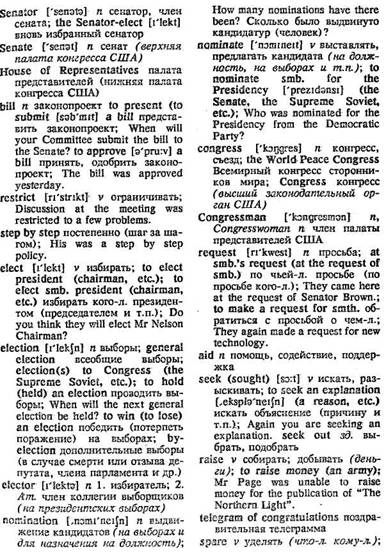
* Only active words, are given in the vocabulary of lesson 17. Look up the words you do not know in the dictionary.
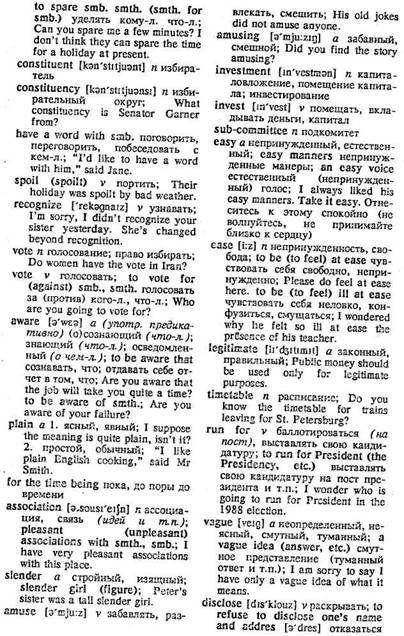
Exercise 6. Read and translate these sentences. Pay attention to active words and word combinations.
1. Do you think the Senators will approve the bill submitted by the President? 2. I suggest we should restrict discussion to two main problems. 3. One third of senators and congressmen are elected to Congress every two years. 4. The journalists said that Eisenhower had won the Republican nomination and then the Presidency because cf his great apularity and fame as a war hero. 5. Who do you think will зе nominated for President in 1992 in the USA? 6. He sounded, he knew, as if he were seeking votes. 7. The Senator iraed to Peter, "But surely you will want to do something aore than raise money." 8. Jane accepted an invitation to ave lunch with them after she had sent some papers to one of the Senator's constituents. 9. In fact, except for'a telegram of congratulations in November, the Senator had not heard from Clay since the election. 10. Burden looked at the photograph: in the uniform of a colonel*, Clay shook the hand of General MacArthur, who was congratulating the Senator-elect. 11. Aware at last of the other nature, Peter realized that Harold had never been his friend. 12. "How do you mean that?" Peter asked her. "It's plain that your father loves Clay more than you," answered Diana. 13. He said he'd thought it over and decided not to run for he Senate in the coining election. 14. "I plan to write a book", Clay added, he was very much at case. 15. "What's your timetable for next „week?" his mother asked him.
* colonel ['ks:nl] полковник
SENATOR FOR SALE1
On July 22, 1937, Senator Burden Day made a brilliant speech in the Senate and actually killed the bill submitted by the President, thus restricting the President's powers. It wasn't his first move to discredit the President. It was a step by step policy to achieve his aim — to be elected President of the United States. He needed three things for getting a nomination and winning the election campaign: brains and popularity, which he had, and money, which he had not. The first two were important. No less important was the money. A few days had passed after his speech in the Senate and feeling still ran high in Congress circles.
As soon as Burden Day came to his office he sent for Clay Overbury, his administrative assistant. Then he looked through the mail. In the last few days his mail had trebled, and most of it was favourable. He delighted in the praise, even though it was almost invariably followed by a request for aid.
He gave Clay rapid instructions. Journalists to seek out. Editors to write to. Members of Congress to see. Money to be raised. He paused a moment at the thought of money.
"That's the worst of it. That's the one thing which can stop us."
Clay shook his head. "The fat cats love you.2"
"Today. But maybe not tomorrow. After all, no one can be conservative enough for them and..."
"...and be elected President." Clay spoke almost too quickly. But he was right.
"And be elected President. But no one can be President... I can't be President... without their help. That's the problem. Well, at least we've got three years to raise the money..."
"And before then, you'll haye spoken in every state." They planned; they plotted; they guessed; they hoped. Clay showed him telegrams of congratulations and invitations to speak. Mrs Blaine, his secretary, interrupted them several times with news. The Supreme Court3 (unofficially of course) was delighted, and the Vice-President would like to have a word with him if he could spare the time.
Accompanied by Clay, Burden took the elevator4 to the basement, where they boarded the subway car that connected the Senate Office Building5 to the Capitol. 6 They rode with a new Senator and three of his constituents, who were delighted to meet Burden Day whom they considered the Defender of the Constitution.
Squaring shoulders and breathing deeply, Burden nodded to the huge Capitol policeman who guarded the door of the cloakroom and stepped into the world of the Senate.
The cloakroom, narrow as a corridor, ran the length of the Senate Chamber.7 Here, amid black leather sofas and writing tables, the Senators of his party gossiped and politicked. When Burden made his entrance, he was given a playful ovation. Happy; Burden drank a glass of soda-water and listened to praise.
"Best thing we've done in twenty years, and it's all your doing."
"President's sworn to have your neck if it's the last thing he ever does..."
"... will be the last. Old Burden'11 lick him every time..."
"Burden can lick the President in 1940. That's our year."
"Why spoil a good Senator by making a President out of him?".
Then they were joined by the senior Senator from Burden's state. He took Burden's hand in his own. "You're going to be the President, all right. That's as clear as day. Now I've got some advice for you..."
Burden smiled and listened until a pale-faced page came to tell him, "The Vice-President is on the floor.8 He'd like to have a word with you, Senator."
Burden slipped away from his admirers. At the glass doors of the Senate Chamber, he paused to straighten his tie, arrange hair. Then he stepped on the floor of the Senate, and was home.
Careful not to look at the gallery, Burden walked up the aisle to his seat, chin held high so that he would be recognized. He was. There was a patter of applause. There were several men in the press box, while the gallery was perhaps a third full, which was remarkable on a day when there was neither a debate nor a vote. Evidently the people had come to see him, and the Senate which had humbled the President. Several Senators stopped to congratulate him, each aware of the hundreds of watching eyes.
Then Burden saw the Vice-President. He was not in the chair but beside it, talking to a group of Senators. The Vice-President and Burden exchanged a few words. But what the exchange meant was plain to those who understood the workings of The Club9. The Vice-President had allied himself with Burden Day. They were one, for the time being. That was better than Burden had hoped. With the Vice-President's support in 1940, the thing was his.
Delighted Burden returned to the cloakroom. He was halfway to the main door when Clay joined him. "What did the Vice-President say?" he asked.
"He's with us. All the way," Burden answered.
Outside the Capitol the heat was awful. He ought to stay at the Capitol where it was cool but he preferred to be alone with his triumph.
"Nice work,- Senator." The voice was pleasant; the associations not.
Burden turned as a man, slender and cool in brown gaberdine, approached.
"I'm waiting for my car," said Burden irrelevantly.
"What else?" Mr Nillson was amused, quite aware of the effect he was making. "I saw you just now with the Vice-President. He must have been pleased at what's happened."
Burden turned to look down the driveway for Henry and the Packard. But neither was in sight. The amiable voice continued. "In fact everyone's pleased with you. Do you know that the Hearst papers are going to propose you for President?"
The man was canning, no doubt about it. Burden.was unable to disguise his interest. "How do you know?"
"I never disclose sources, Senator. You'll find that's my best quality. By the way, I can tell you that the Day for President campaign will begin with tomorrow's editorial, written by the old man himself."
"That's very interesting, Mr Nillson."
"I think you would be a remarkable President. I would certainly vote for you."
"Mr Nillson..."
"Sir?"
"Who the hell are you?"11
"A friend."
"No, you are not a friend."
"Then I should like to be. After all, we choose our friends because they are not like ourselves. I shall never be a great statesman, like you. You live a life that I might have wanted, but as there is not time for one person to be everything, I choose ray friends so that through them I can be a politician, a journalist, an artist..."
"A criminal?"
"Yes, even a criminal."
"But what do you do?"
"I'm a businessman. Now I have spoken very directly to you, Senator. I have been completely honest."
"Yes, you have. And do you know the penalty for bribing... for attempting to bribe a member of Congress?"
"Among my many friends there are lawyers." Mr Nillson was genuinely amused. "I know the law's penalties. Also the world's rewards. I wish you would think seriously about what I said to you the-otherday."
.._ Burden felt himself losing control again. "There is nothing to think about. I don't take..." he found himself lowering his voice automatically even though no one was within earshot, "bribes."
"Others..."
"I don't care what others do."
"Is an investment in your career a bribe? A contribution to electing you President, is that a bribe? How do you think money is ever raised for a national campaign? Anyway, should I invest in your future, I shall demand a good deal less of you than, say. the CIO12 or the National Association of Manufacturers."13.
"I am not for sale, Mr Nillson."
"I don't want to buy you, Senator." The easy voice was as cold now as his own. "I will give you the money that you need if you make it possible for me to buy what I want. That is a legitimate exchange and it is called "business". I only want your sub-committee not to object to my buying a hundred thousand acres of Indian land."
Burden's Packard arrived, and he got in without a word.
Now, Burden told himself, he must think, plan for the future, devise a timetable extending from this very moment to that day in November of 1940 when he would run for President. First he would talk to Blaise Sanford about money. Then he would go to William Randolph Hearst and make it perfectly clear that... His mind shifted stubbornly: despite the boldness of Mr Nillson's offer (and the assumption behind it) he had never in his life taken a bribe. At worst he had accepted campaign money with the vague understanding that he might some day be of use to the donor, a disagreeable procedure but the way things were done in the Republic. Mr Nillson, however, had offered a straightforward bribe.
Had other Senators been approached? Senators seldom discussed such things. He recalled the embarrassment that they had all felt when a famous but poor member of the Club had died and his widow discovered eight hundred thousand dollars in a safety deposit box. "Well," Burden had said to a colleague when this was mentioned in the Senate dining-room. "Well," the colleague had replied.
(From "Washington, D. C." by Gore Vidal)
Names
Burden [bs'.dn] Day Берден Дей
Clay Overbury ['ouvsbsn] Клей Овербери
Mrs Elaine миссис Блейв
William Randolph J'raendo] Hearst Уильям Рандольф
Херст (американский газетный магнат) Blaise [bleiz ] Saodford Блейз Сзндфорд
Notes
1. Senator for Sale. Продается сенатор.
2. The fat cats love you. Жирные коты (зд. крупные капиталисты) любят вас.
3. the Supreme Cot [sju'pri:m 'ko:t ] Верховный суд
4. elevator ['elav] n Am. лифт (Br. lift)
5. the Senate Office Building здание, в котором размещены рабочие кабинеты сенаторов
6. the Capitol ['kaepitl ] Капитолий (здание конгресса США)
7. the Senate Chamber зал заседаний сената
8. The Vice-President is on the floor, зд. Вице-президент в зале заседаний.
9. the Club — закрытый клуб, членами которого являются наиболее влиятельные сенаторы
10. the Day for President. Автор использует игру слов: day д<




















